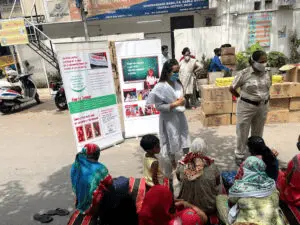How NGOs Improve Access to Healthcare in India

How NGOs Improve Access to Healthcare in India

In a diverse and populous country like India, access to healthcare has been a significant challenge for many. While progress has been made in recent years, millions still struggle to receive adequate medical attention. Thankfully, a ray of hope shines through the work of healthcare Non-Governmental Organizations (NGOs). These organizations, fueled by compassion and driven by a mission to serve, play a pivotal role in bridging the gap between healthcare services and those in need.
Understanding Healthcare NGOs:
Healthcare NGOs, or Non-Governmental Organizations, are non-profit entities that operate independently of government control. Their primary focus is to address health-related issues and provide healthcare assistance to underserved communities. These organizations operate on various scales, from grassroots efforts in local communities to nationwide initiatives tackling widespread health challenges.
Top Healthcare NGOs in India:
India is home to a multitude of healthcare NGOs, each dedicated to addressing specific health issues and serving diverse demographics. Among the notable ones are:
1. My Abhinandan: Known for its work in education, My Abhinandan also runs healthcare programs focusing on improving maternal and child health in rural areas.
2. Arpana Trust: This NGO focuses on healthcare, education, and community development in rural Haryana, emphasizing preventive healthcare and health education.
3. Smile Foundation: Operating across India, Smile Foundation provides healthcare services to underprivileged communities, with a particular emphasis on children’s health and education.
4. SEEDS: SEEDS works on disaster management and community resilience, including health interventions in disaster-prone areas.
5. CARE India: With a focus on women and children, CARE India implements healthcare programs aimed at improving maternal health, child nutrition, and access to healthcare services in rural areas.
These organizations, among many others, exemplify the diverse efforts being made to improve healthcare access in India.
Impact of Healthcare NGOs:
The impact of healthcare NGOs in India is profound and far-reaching. Here are some key ways in which they are making a difference:
1. Providing Medical Services: Healthcare NGOs set up medical camps, clinics, and mobile health units to reach remote and underserved areas where healthcare facilities are lacking. These initiatives offer essential medical services, including consultations, vaccinations, and basic treatments, free of cost or at subsidized rates.
2. Health Education and Awareness: Many NGOs conduct health education programs to raise awareness about prevalent diseases, preventive measures, and healthy practices. By empowering communities with knowledge, they aim to prevent illnesses and promote overall well-being.
3. Capacity Building: Healthcare NGOs often train local healthcare workers, including community health workers and traditional birth attendants, to enhance their skills and knowledge. This capacity-building approach strengthens the healthcare infrastructure at the grassroots level and ensures sustainable healthcare delivery.
4. Advocacy and Policy Influence: Beyond direct service provision, healthcare NGOs advocate for policy changes and government interventions to address systemic issues affecting healthcare access. They collaborate with stakeholders, conduct research, and lobby for improved healthcare policies and funding allocations.
5. Emergency Response and Disaster Relief: In times of natural disasters or health emergencies, healthcare NGOs play a critical role in providing emergency medical assistance, relief supplies, and long-term support for affected communities. Their swift response saves lives and helps rebuild communities.
Challenges Faced by Healthcare NGOs:
Despite their significant contributions, healthcare NGOs in India encounter several challenges that hinder their effectiveness:
1. Funding Constraints: Many NGOs struggle to secure adequate funding to sustain their operations and expand their reach. Reliance on donations and grants makes them vulnerable to fluctuations in funding sources.
2. Logistical Hurdles: Operating in remote and rural areas often presents logistical challenges, including transportation, infrastructure limitations, and communication barriers. These hurdles can impede the timely delivery of healthcare services.
3. Regulatory Compliance: NGOs must navigate complex regulatory requirements and bureaucratic processes, which can be time-consuming and resource-intensive. Compliance with government regulations while maintaining operational flexibility poses a constant challenge.
4. Community Engagement: Building trust and engaging with local communities requires cultural sensitivity, community participation, and grassroots involvement. Effective community engagement is essential for the success and sustainability of healthcare interventions.
5. Sustainability: Ensuring the long-term sustainability of healthcare initiatives is a persistent challenge for NGOs. Balancing short-term interventions with long-term impact and fostering local ownership and capacity are key factors in achieving sustainability.
Our Thoughts
In India, where healthcare access remains a pressing issue, healthcare NGOs are beacons of hope, bringing medical care and compassion to those in need. Through their tireless efforts, these organizations are transforming lives, strengthening communities, and shaping a healthier future for all. While challenges persist, the dedication and resilience of healthcare NGOs continue to inspire positive change, one patient, one community at a time. As we acknowledge their invaluable contributions, let us support and amplify their efforts to build a more inclusive and equitable healthcare system for every Indian.
Tags: best healthcare ngo in india, health related ngos in india, Healthcare NGOs, healthcare ngos in india, ngo in healthcare, ngo in india for healthcare, top healthcare ngos in india